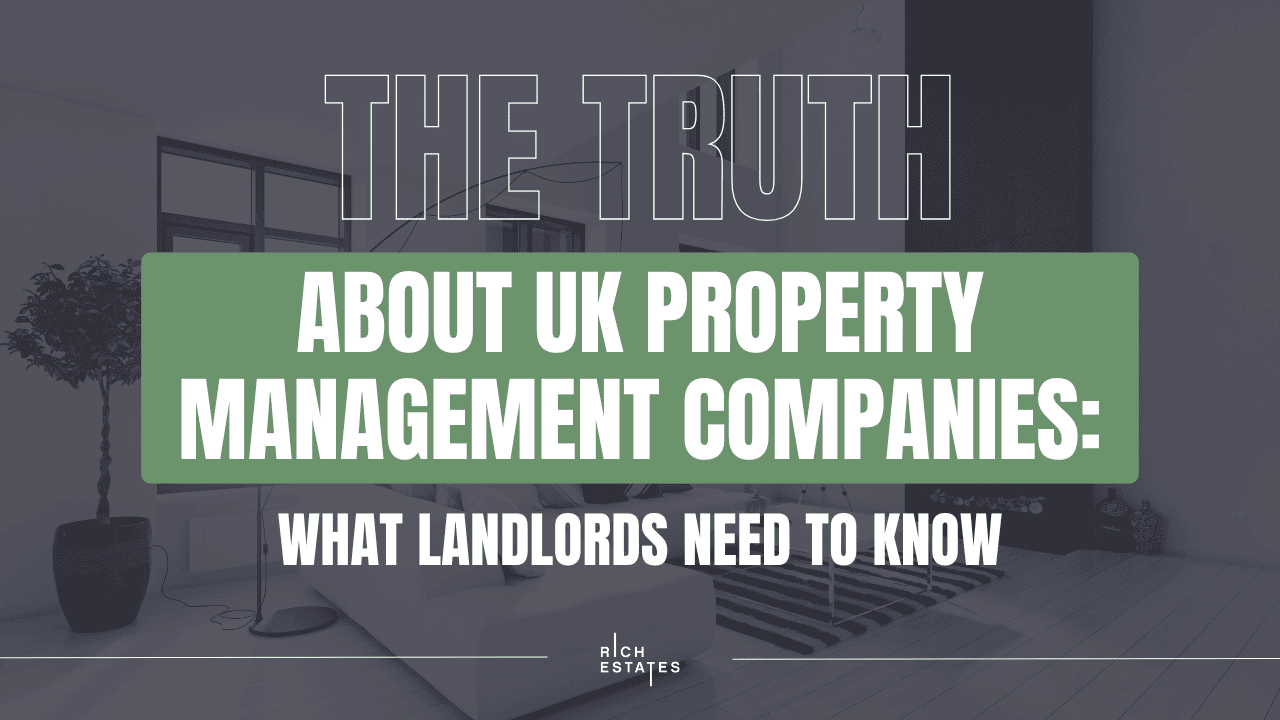
If you're a landlord in the UK, chances are you've considered—or already worked with—a property management company or letting agent. On the surface, it sounds ideal: they find tenants, handle maintenance, collect rent, and let you enjoy passive income. But in reality, many landlords discover a completely different experience once they hand over the keys.
In this article, we break down the real issues landlords face when dealing with property management companies in the UK, and what you should check before signing any agreement. If you’re searching for transparency, this guide reveals everything they don’t want you to know.
Poor Communication: The Most Common Complaint
One of the biggest frustrations landlords report is the lack of clear communication.
You call or email about rent, maintenance issues, or updates, and either get no response or you're passed between departments. The accounts team tells you to talk to the property manager, and the manager says they’ll “get back to you.” Days go by, sometimes weeks, with no resolution.
Tenants face the same issue. They report a leak, heating failure, or mould, and hear nothing. Not only does this create dissatisfaction, but it reflects poorly on you, the landlord, even when you're not the one at fault.
Why it matters:
Poor communication leads to tenant churn
Delays cost you money in repairs or prolonged void periods
You end up managing the managers
Maintenance Markups and Overspending
Another common trap is the automatic assignment of maintenance jobs to agency-affiliated contractors. Without your approval, they might:
Hire their preferred vendor (regardless of cost)
Apply a hidden markup (e.g., £120 job becomes £190)
Fail to notify you until the job is done
Worse, the workmanship is often subpar. You might find yourself fixing the same issue repeatedly, at your own expense.
Rushed Tenant Referencing
Many landlords assume that letting agents are conducting full tenant background checks. But the truth is, some agencies are more interested in filling the property quickly to earn their commission than finding the right tenant.
That means:
Inadequate affordability checks
No previous landlord references
No thorough credit screening
You’re left dealing with tenants who miss rent, damage your property, or cause neighbour complaints.

Long Void Periods Due to Agency Neglect
You would expect your property manager to hustle to fill an empty property—but that’s not always the case. Listings go stale, viewing appointments are limited, and enquiries are missed.
If you’re not actively chasing them for updates, nothing happens.
Meanwhile:
You lose rental income daily
You're still paying the mortgage and council tax
Some agents still charge re-letting fees after long voids
Hidden and Excessive Fees
Most landlords think they’re only paying 10–12% management fees + VAT. But the actual cost can be much higher once you factor in:
Setup fees
Renewal fees
Check-in/check-out inspection charges
Compliance admin fee (e.g. gas safety certificates, EICRs, HMO licensing support)
HMRC admin fees (for handling tax reporting or issuing landlord statements)
Maintenance coordination surcharges
These are often buried in contracts or unclear during onboarding.
Example: You let a £1,200/month property. With setup (£300), referencing (£100), check-in (£150), and ongoing fees, your first month’s income might drop to £400 or less.
Restrictive and Unfair Contracts
Be cautious of letting agents who tie landlords into 12-month or auto-renewing contracts. Worse still, some contracts:
Charge exit fees if you leave early
Allow the agent to keep collecting fees even after termination
Require you to pay if the tenant renews independently
This makes it very difficult to switch agencies, even when service is poor.
Lack of Ownership Mentality
At the end of the day, many property managers simply don’t treat your property with the care it deserves.
To them, it's one of hundreds. But to you, it's:
A long-term investment
A pension plan
A financial safety net
That disconnect can mean you’re left with:
Preventable property damage
Poor tenant relations
Underperformance year after year

What to Check Before Signing a Property Management Agreement
Here’s a checklist every UK landlord should use before hiring a letting agent or management firm:
1. Transparent Fee Structure
Get a complete breakdown of all fees upfront, not just the advertised monthly management percentage.
Ask to see everything in writing: setup fees, tenancy renewal charges, referencing costs, and maintenance coordination mark-ups.
Enquire whether fees are fixed or variable, and if they apply per tenancy, per year, or per event.
Don’t forget to ask about VAT. Some agents quote excluding VAT, which increases your actual outgoings by 20%.
A trustworthy agency will disclose every potential charge in advance, not hide them in the small print.
2. Contract Exit Terms
Clarify the full term of the agreement, is it 6 months, 12 months, or rolling?
Ask about exit procedures: how much notice is required and whether there are early termination penalties.
Some agencies include clauses that let them continue charging management fees even after you’ve left, if the tenant remains in place. Always get this in writing.
Understand renewal auto-triggers, does your contract renew automatically if you don’t give notice?
Ensure there are no fees for withdrawing your property from the market before it’s let.
3. Communication Channels
Who do you speak to for routine matters? Ask whether you’ll have a single point of contact or be passed between departments. A dedicated property manager can drastically improve your experience, but only if they remain consistent throughout the tenancy.
How fast is the average response time? Request examples of past response times for both landlords and tenants. Ask how emergencies are handled and what their communication policy is (e.g. 24–48 hours max response time).
Ask for a sample monthly landlord report A good agent should be able to show you what a typical performance report looks like, including income, expenses, repairs, and key dates.
Find out how often property managers change, some agencies have high staff turnover, meaning your assigned contact may change frequently. This can disrupt consistency, delay decision-making, and create confusion when issues arise.
4. Tenant Screening Process
Ask for a step-by-step breakdown of their referencing procedure: income verification, credit history checks, and rental references.
Check whether they use an external referencing company or do it in-house, quality can vary greatly.
Find out whether you as the landlord have final approval before a tenant is accepted, and whether you’ll be presented with more than one applicant.
Ensure they assess affordability accurately based on current rent-to-income standards (typically 2.5–3x monthly rent).
Don’t assume vetting is thorough — request proof or templates of their standard checks.
5. Maintenance Authorisation
Clarify whether you will be consulted before any repairs are carried out, and if so, above what cost threshold (e.g., £100, £250).
Ask whether you’re allowed to use your own vetted contractors instead of the agency’s preferred suppliers.
Determine whether emergency repairs are actioned automatically and how you’ll be informed.
Find out if the agency adds a commission or markup to third-party repair bills.
Request monthly maintenance logs to keep track of recurring issues and costs.
6. Compliance & Legal Duties
Confirm which party is responsible for organising and renewing compliance certificates: gas safety, EICRs, PAT tests, fire and smoke alarms, EPCs, and HMO licences if applicable.
Ask if they track renewal dates using a digital system or calendar reminders.
Check who handles deposit registration with a government-approved scheme, and within what timeframe.
Find out who manages deposit disputes and whether you’re consulted before any deductions are agreed with the tenant.
Ensure all legal duties are documented in the contract to protect yourself from fines or liability.
Final Thoughts
Not all property management companies are bad, but many are undertrained, overbooked, or focused on volume over quality. If you’re a landlord in the UK, especially in a volatile rental market, you can’t afford to hand your property to someone who doesn’t truly care.
Do your homework. Ask hard questions before signing any agreement. Get everything in writing.
And remember: the best agents work with you, not just for your money.
If you’ve had a frustrating experience with a letting agent or want a second opinion on your current setup, feel free to get in touch with the Rich Estates team. We specialise in helping landlords get better results with transparency and accountability.
Related Reading:

Your trusted partner for secure, high-yield property investments and seamless real estate management in the UK & Cyprus.
Navigations
Copyright © 2025 Rich Estates